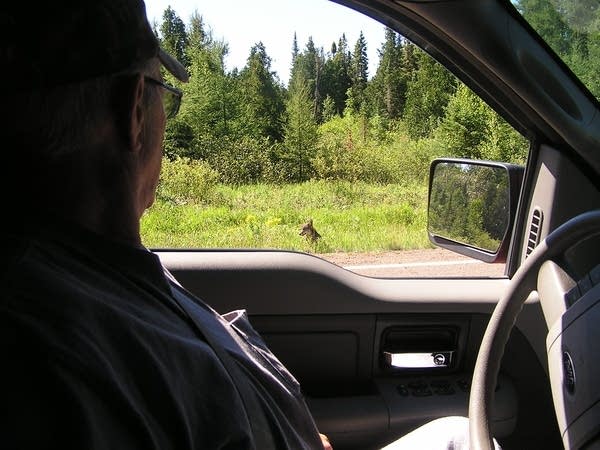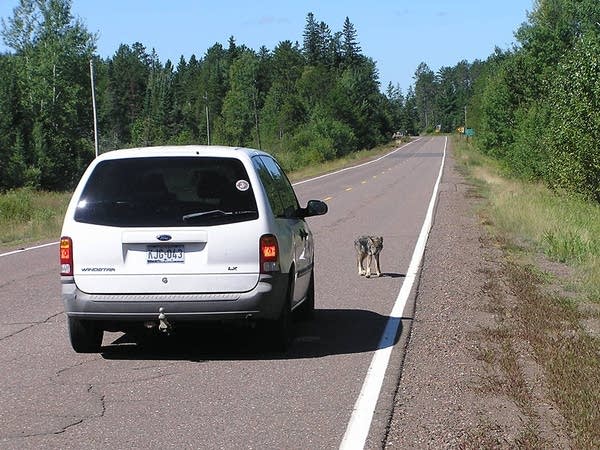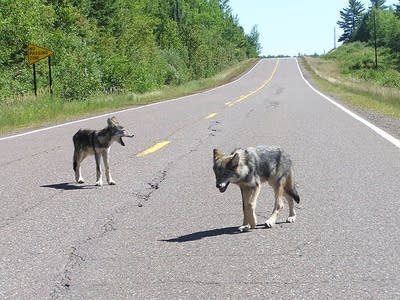In northern Minn., a campaign against feeding wolves
Go Deeper.
Create an account or log in to save stories.
Like this?
Thanks for liking this story! We have added it to a list of your favorite stories.

"Don't feed the wildlife!" is a message frequently trumpeted at campgrounds around Minnesota. It's usually meant to warn people not to feed deer or bears.
But this summer wildlife managers are expanding that message to wolves.
In at least two locations in northeast Minnesota, people are feeding wolf pups -- easy meals that could have very negative consequences.
At Hugo's, the bar and general store that Gary Hepola runs with his wife in the tiny town of Brimson, about 40 miles north of Duluth, it doesn't take long to see a wolf pup.
Turn Up Your Support
MPR News helps you turn down the noise and build shared understanding. Turn up your support for this public resource and keep trusted journalism accessible to all.
"You'll notice they have no fear here," said Hepola as he pulled his pickup out of the parking lot. "They'll come right up to that window."

Sure enough, the young wolf, with pointy ears and splotches of gray, white and tan fur, ambles right up to Hepola's open window. "What are you doing? Get off the road!"
Hepola said the wolves have grown steadily bolder over the past six weeks or so. He has seen people place piles of food on the side of the road to lure the wolves in close to snap pictures.
"I've chewed a few people out [and] said, 'Don't be feeding the wolves,'" he said. "People don't realize they're going to become adults. They're cute now -- not so cute when they're big."
Hepola fears that some of the pups might not even make it to adulthood. One of eight was killed by a car last week.
That number could grow, said Nancy Hansen, assistant area wildlife manager in Two Harbors for the Department of Natural Resources.
"They are at a very busy intersection," Hansen said. "It's going to get busier, with hunting season coming up, so I'm concerned."
Hansen said the wolf pups are using a stretch of forest near the intersection of two county highways as a rendezvous site. The adults in the pack leave the pups to hunt and return with food.

Wildlife experts say people sometimes see wolf pups alone, perhaps think they look thin, and assume they have been abandoned and need food. Hansen said the DNR is trying to educate the public otherwise.
"Basically, we really need people to police themselves," she said. "As neat as it is to see these animals, this is not a normal situation, and anything they're doing to get their picture taken with a wolf pup or feed a wolf pup, it's not good for the pups."
Hansen said officials cannot relocate the pups, because they would either die away from the pack or just return to the rendezvous point.
"If we can't turn it around, we'll probably have to capture the pups, they'll either have to be moved to a facility, or destroyed," she said.
Hansen said she has never seen a situation like the "Hugo's wolves" as she refers to them. She said news of the wolves has spread like wildfire on Facebook, and more and more people are flocking to see them.
Jess Edberg, the information services director at the International Wolf Center in Ely, is dealing with a similar situation on the Echo Trail near the Boundary Waters Canoe Area.

"The wolf pups were walking across the road, sitting on the road, watching vehicles go by, and somebody did see there was fresh food put out there the other day," she said.
Edberg said every year or two she hears of emboldened wolves not fleeing from passing cars. In those situations, she said, it's not enough to simply not feed them. She said even a passive observer can encourage wolves to frequent an area.
"We want to make sure that wildlife have a healthy fear avoidance of humans, so honking your horn or yelling, not encouraging the animal to be there is going to be helpful for the survival of that animal," Edberg said.
At Hugo's Bar in Brimson, owner Jody Hepola said the wolves have become something of a tourist attraction.
"The store's been busy," she said. "Lots of people come in to comment and get a snack while they're out looking for the wolves, and lots of phone calls, asking, 'Are they're really wolves up there? What time of day, where can we see them?"
But Hepola said she would gladly give up the increased business. She wants the wolves to learn to fend for themselves.





